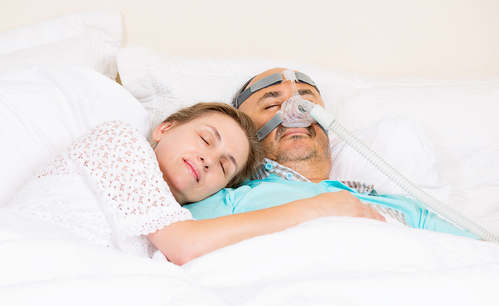Symptoms and Treatment Options for Sleep Apnea
 Sleep apnea is a condition wherein the individual’s breathing repeatedly stops and starts. Some people with sleep apnea don’t even know that they have it until they share a bed with another person, who will then notice the unusual breathing patterns. For some individuals, however, sleep apnea can be a serious sleep disorder that greatly interferes with their quality of life. If you suspect you have sleep apnea, keep reading to learn some of the symptoms, as well as common treatment options available to you.
Sleep apnea is a condition wherein the individual’s breathing repeatedly stops and starts. Some people with sleep apnea don’t even know that they have it until they share a bed with another person, who will then notice the unusual breathing patterns. For some individuals, however, sleep apnea can be a serious sleep disorder that greatly interferes with their quality of life. If you suspect you have sleep apnea, keep reading to learn some of the symptoms, as well as common treatment options available to you.
Types of Sleep Apnea
Before we get into the signs and symptoms of this sleep order, it’s important to be aware of the 3 different types of sleep apnea. They are as follows:
1. Obstructive sleep apnea – This is the most common form of sleep apnea. It is caused by the relaxing of the throat muscles, which then obstruct the airway during sleep.
2. Central sleep apnea – This type of sleep apnea occurs when the brain does not send the proper signals to the muscles that control your breathing when you are asleep.
3. Complex sleep apnea syndrome – This occurs when the individual has some combination of both of the above types of sleep apnea.
Determining which type of sleep apnea you have is important in receiving the proper treatments, so be sure to speak to a doctor if you believe you have sleep apnea.
Signs and Symptoms
Though there are different types of sleep apnea, most of the signs and symptoms overlap. Here are some of the most common symptoms of sleep apnea in any form:
-Very loud snoring
-Regularly waking with a dry mouth
-Headaches upon waking
-Repeatedly waking at night (insomnia)
-Extreme sleepiness during the day
-Difficulty focusing when awake
-Irritability
-Episodes in which you stop breathing while asleep (usually reported by another person)
-Gasping for air in your sleep (usually reported by another person)
If you have several of these symptoms, it may be a good idea to speak to your doctor and ask about the options that are available to you.
Receiving a Diagnosis
Sleep apnea should always be diagnosed by a doctor before you attempt any form of treatment. Often, your doctor can make a diagnosis based on your reported symptoms, with the help of someone who shares your bed or your room, if possible. They may also provide you with home sleep tests, which measure your heart rate, blood oxygen level, and breathing patterns during sleep. If these are abnormal, you’ll likely be diagnosed with sleep apnea, or you may be referred to a sleep disorder center for further analysis.
Treatment Options
The treatment options available to you will largely depend on the type of sleep apnea you have, as well as the severity of your condition. For mild cases, your doctor may simply recommend lifestyle changes, such as weight loss or giving up smoking. If your doctor believes your sleep apnea is allergy related, they may provide treatment for those allergies to improve your condition.
For more severe sleep apnea, or when the above-mentioned treatments don’t work, other options are available. Here are some of the most common treatments for sleep apnea:
-CPAP machines – Continuous positive airway pressure (CPAP) devices provide air pressure through a mask while you sleep. The air pressure helps to keep your upper airway passages open, effectively treating obstructive sleep apnea. While CPAP is the most common and reliable method for treating this type of sleep apnea, many people find it difficult to adjust to sleeping with the mask on. It is in your best interest to continue with your CPAP device and adjust to sleeping with it on. You may need to try different types of masks and devices to find one that is most comfortable for you. At Medical Xpress, we carry several types of CPAP machines, including comfortable CPAP pillows that make it easier to sleep with your mask on.
-BPAP devices – If you struggle to adjust to a CPAP device because you find the continuous air pressure uncomfortable, ask your doctor about a bilevel positive airway pressure (BPAP) device. These provide more pressure when inhaling and less when exhaling, which can be more comfortable for many patients.
-Oral appliances – There are oral appliances available that help to keep the airway open as well. They are less reliable than CPAP devices, but can be more comfortable and easier to use.
-Surgery – Surgery is usually a last-resort option when other treatments have failed. There are many surgical options, including tissue removal, jaw repositioning, and tracheostomy.
Talk to your doctor about your symptoms and treatment options. And if you’re in need of a sleep apnea device, such as a CPAP machine or oral appliance, visit Medical Xpress at one of our medical supply locations in texas.